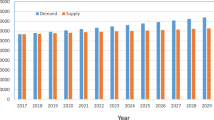Abstract
The evolving surgeon shortage is occurring at a time of societal change. For one of the first times in history, a scientific revolution is occurring while the organization of health care is also changing. With a demand for a more quality health care and a population that has both aged significantly and grown by ten million citizens each decade, the shortage of health care providers is problematic. For surgery, the shortage is particularly challenging. In 1981, 1047 surgeons were certified by the American Board of Surgery; in 2008, that number had dropped to just 909.



Similar content being viewed by others
References
Becker G. Longer life was the century’s greatest gift. Business Week. January 31, 2000;32.
Steinbrook R. Health care reform in Massachusetts—expanding coverage, escalating costs. N Engl J Med 2008;358:2757–2760.
Cutler DM, Rosen AB, Vijan S. The value of medical spending in the United States, 1960–2000. N Engl J Med 2006;355:920–927.
Center for Health Workforce Studies. University of Albany, March 2004. http://chws.albany.edu, accessed May 13, 2009.
Jolly P. Characteristics of applicants who matched to their preferred specialty in the 2005 NRMP main residency match, July 2006. Available at www.nrmp.org/data/matchoutcomes2006.pdf. Accessed May 13, 2009.
Report of the graduate medical education national advisory committee to the secretary of the department of the health and human services. Vol 1. GMENAC summary report. Washington DC: Government Printing Office, 1981.
Sheldon GF. Surgical workforce since the 1975 study of surgical services in the United States. Ann Surg 2007; 246:541–545.
Donaldson M, Yordy K, Vanselow N, eds. Defining primary care: an interim report. Washington DC: National Academy Press, 1992.
Schoen C, Osborn R, Huynh PT, Doty M, Peugh J, Zapert K. On the front lines of care: primary care doctors’ office systems, experiences, and views in seven countries. Health Aff (Millwood) 2006;25:w555–571.
Croasdale M. Advanced-practice nurses seek wider scope in 24 states (American College of Physicians Annual Meeting). AMA News. April 21, 2008;1–2.
Landers SJ. Consolidating Care. AMA News. June 16, 2008, vol 51, no 23, p 19–20.
Holmes GM, Slifkin RT, Randolph RK, Poley S. Underserved populations: the effect of rural hospital closures on community economic health. Health Serv Res 2006; 41:467–485.
Leading causes of death. National Center for Health Statistics. December 2009.
Lynge DC, Larson EH, Thompson MJ, Rosenblatt RA, Hart LG. A longitudinal analysis of the general surgery work force in the United States, 1981–2005. Arch Surg 2008; 143:345–350.
Fischer JE, The impending disappearance of the general surgeon. JAMA 2007;298:2191–2193.
Mullan F. N Engl J Med 2005;353:1810–1818.
American Hospital Association. Special Workforce Survey, 2001. Accessed May 13, 2009 at http://www.aha.org/aha/content/2001/pdf/FcgWorkforceReport.pdf
World Health Organization. Accessed May 13, 2009 at http://www.who.int/whr/2006/en.
Longitudinal trends in the U.S. surgical workforce 1981–2006 L overall growth has stalled; general surgery supply contracting. May 2009, Issue 1. (data from the American College of Surgeons Health Policy Research Institute and the Cecil G. Sheps Center for Health Services Research, Chapel Hill, North Carolina).
Author information
Authors and Affiliations
Corresponding author
Rights and permissions
About this article
Cite this article
Sheldon, G.F. The Evolving Surgeon Shortage in the Health Reform Era. J Gastrointest Surg 15, 1104–1111 (2011). https://doi.org/10.1007/s11605-011-1430-0
Received:
Accepted:
Published:
Issue Date:
DOI: https://doi.org/10.1007/s11605-011-1430-0



